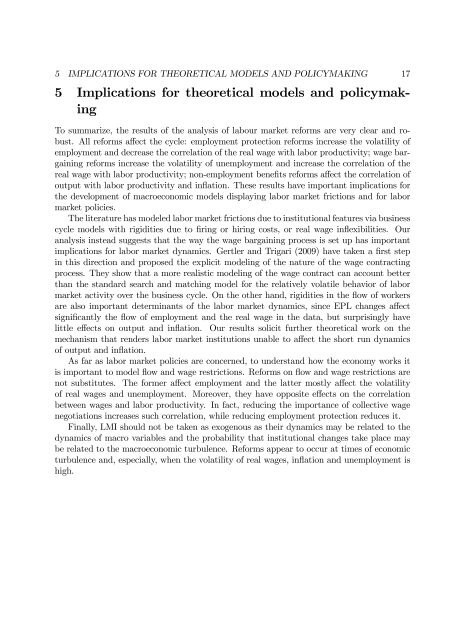Do labor market institutions matter for business cycles?∗ - European ...
Do labor market institutions matter for business cycles?∗ - European ...
Do labor market institutions matter for business cycles?∗ - European ...
Create successful ePaper yourself
Turn your PDF publications into a flip-book with our unique Google optimized e-Paper software.
5 IMPLICATIONS FOR THEORETICAL MODELS AND POLICYMAKING 17<br />
5 Implications <strong>for</strong> theoretical models and policymaking<br />
To summarize, the results of the analysis of labour <strong>market</strong> re<strong>for</strong>ms are very clear and robust.<br />
All re<strong>for</strong>ms affect the cycle: employment protection re<strong>for</strong>ms increase the volatility of<br />
employment and decrease the correlation of the real wage with <strong>labor</strong> productivity; wage bargaining<br />
re<strong>for</strong>ms increase the volatility of unemployment and increase the correlation of the<br />
real wage with <strong>labor</strong> productivity; non-employment benefits re<strong>for</strong>ms affect the correlation of<br />
output with <strong>labor</strong> productivity and inflation. These results have important implications <strong>for</strong><br />
the development of macroeconomic models displaying <strong>labor</strong> <strong>market</strong> frictions and <strong>for</strong> <strong>labor</strong><br />
<strong>market</strong> policies.<br />
The literature has modeled <strong>labor</strong> <strong>market</strong> frictions due to institutional features via <strong>business</strong><br />
cycle models with rigidities due to firing or hiring costs, or real wage inflexibilities. Our<br />
analysis instead suggests that the way the wage bargaining process is set up has important<br />
implications <strong>for</strong> <strong>labor</strong> <strong>market</strong> dynamics. Gertler and Trigari (2009) have taken a first step<br />
in this direction and proposed the explicit modeling of the nature of the wage contracting<br />
process. They show that a more realistic modeling of the wage contract can account better<br />
than the standard search and matching model <strong>for</strong> the relatively volatile behavior of <strong>labor</strong><br />
<strong>market</strong> activity over the <strong>business</strong> cycle. On the other hand, rigidities in the flow of workers<br />
are also important determinants of the <strong>labor</strong> <strong>market</strong> dynamics, since EPL changes affect<br />
significantly the flow of employment and the real wage in the data, but surprisingly have<br />
little effects on output and inflation. Our results solicit further theoretical work on the<br />
mechanism that renders <strong>labor</strong> <strong>market</strong> <strong>institutions</strong> unable to affect the short run dynamics<br />
of output and inflation.<br />
As far as <strong>labor</strong> <strong>market</strong> policies are concerned, to understand how the economy works it<br />
is important to model flow and wage restrictions. Re<strong>for</strong>ms on flow and wage restrictions are<br />
not substitutes. The <strong>for</strong>mer affect employment and the latter mostly affect the volatility<br />
of real wages and unemployment. Moreover, they have opposite effects on the correlation<br />
between wages and <strong>labor</strong> productivity. In fact, reducing the importance of collective wage<br />
negotiations increases such correlation, while reducing employment protection reduces it.<br />
Finally, LMI should not be taken as exogenous as their dynamics may be related to the<br />
dynamics of macro variables and the probability that institutional changes take place may<br />
be related to the macroeconomic turbulence. Re<strong>for</strong>ms appear to occur at times of economic<br />
turbulence and, especially, when the volatility of real wages, inflation and unemployment is<br />
high.
















